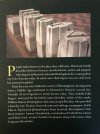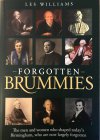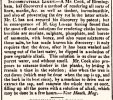Dear All
I wanted to bring to your attention the publication of my book in November 2021. Since retiring from the NHS full time, I became interested in the local history of Birmingham at first through the blue plaques erected in Birmingham which commemorate significant figures from the history of the city. This developed into a collection of short biographies of twenty nine people who have significantly contributed to the development of Birmingham from Roman settlement, to medieval hamlet, to growing town at the centre of the Industrial Revolution, to the second largest city in the UK. Most of these people are not known to Brummies today, so the book is called: ‘Forgotten Brummies: the men and women who shaped today’s Birmingham, who are now largely forgotten’.
I have attached images of the front and rear covers of the book. As well as the nine people listed on the rear cover, there are short lives of the following:
Many thanks for your time in reading this.
Les Williams
I wanted to bring to your attention the publication of my book in November 2021. Since retiring from the NHS full time, I became interested in the local history of Birmingham at first through the blue plaques erected in Birmingham which commemorate significant figures from the history of the city. This developed into a collection of short biographies of twenty nine people who have significantly contributed to the development of Birmingham from Roman settlement, to medieval hamlet, to growing town at the centre of the Industrial Revolution, to the second largest city in the UK. Most of these people are not known to Brummies today, so the book is called: ‘Forgotten Brummies: the men and women who shaped today’s Birmingham, who are now largely forgotten’.
I have attached images of the front and rear covers of the book. As well as the nine people listed on the rear cover, there are short lives of the following:
- William Lench - The Moor Street tanner whose generosity lives on after five hundred years
- John Baskerville - The innovative printer whose story did not conclude until one hundred and twenty three years after his death
- Sampson Lloyd - The local iron master who became a banker whose name lives on in Lloyds Bank
- John Ash - The founder of Birmingham General Hospital in Summer Lane
- James Keir - The most famous resident of West Bromwich that nobody knows
- William Withering - A polymath, a Lunatick, the inventor of digitalis, and the foe of Erasmus Darwin
- Samuel Galton Junior - The successful gun manufacturer who followed a pacifist religion
- George Bodington - The pioneering physician who revolutionised the care of tuberculosis
- William Sands Cox - The determined, or stubborn, surgeon who founded Birmingham’s first Medical School, and The Queen’s Hospital, later Birmingham Accident Hospital
- Joseph Sturge – ‘He laboured to bring freedom to the negro slave, the vote to British workmen, and the promise of peace to a war-torn world’
- Louisa Anne Ryland - The wealthy heiress who did not wish her considerable kindness and philanthropy to be known
- Joseph Chamberlain - ‘Birmingham’s greatest man’ and ‘the father of modern Birmingham’, ‘the most trusted man in England’ and ‘the first minister of the Empire’
- John Jaffray - The educational and health care philanthropist who co-founded the Birmingham Post
- Joseph Sampson Gamgee - The eminent surgeon and pioneer of cleanliness in surgery, who founded the Birmingham Hospital Saturday Fund, providing access to health care for thousands of poor and working class people
- Robert Lawson Tait - The often controversial father of modern gynaecology and a driving force in the founding of Birmingham Women’s Hospital
- Neville Chamberlain – The highest-achieving politician Birmingham has produced, and the most reviled
- John Sutton Nettlefold – The innovative creator of the Moor Pool Estate and the father of town planning in Britain
- Harry Gilbert Barling – The accomplished surgeon who planned and opened the expanded General Hospital and ran the Birmingham Hospital Saturday Fund and the Birmingham Civic Society
- John Hall-Edwards – The dedicated soldier and doctor who pioneered the use of X-rays in Great Britain, to the benefit of many, but at great personal cost to himself
- Naughton Dunn – The Scottish surgeon who developed revolutionary orthopaedic operations, particularly on the foot, and helped to establish this field as a separate specialty, as well as being an inspirational clinical teacher
Many thanks for your time in reading this.
Les Williams



